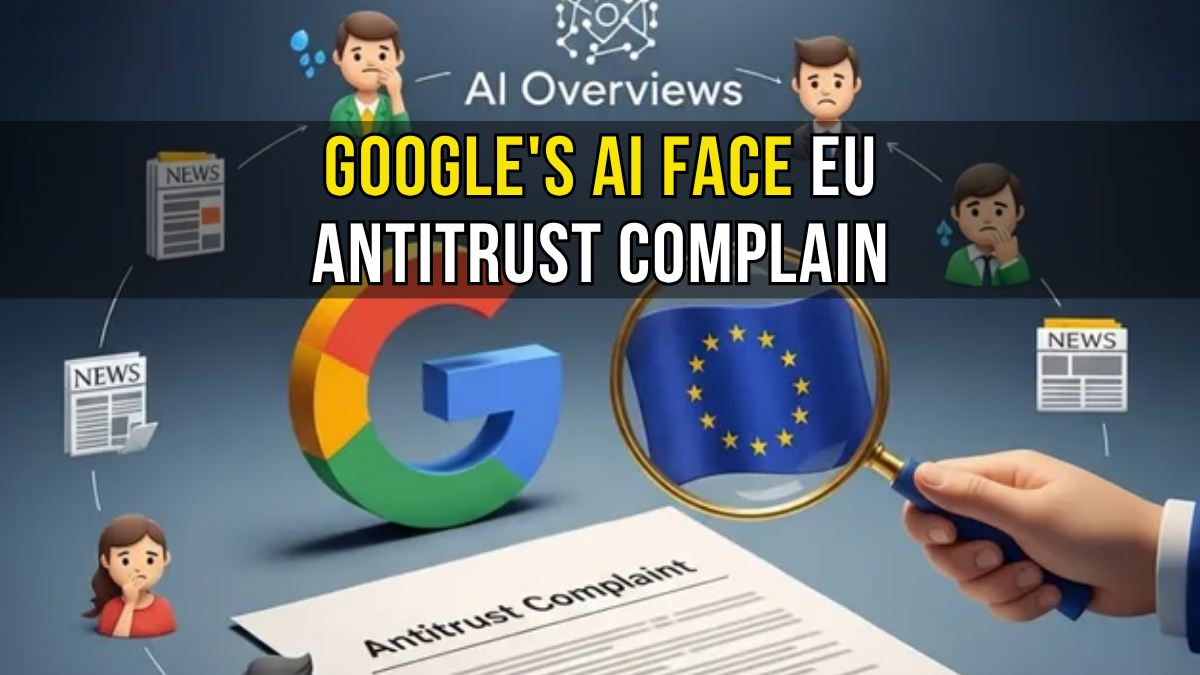Independent publishers across Europe are pushing back against Google’s AI Overviews feature, filing a formal antitrust complaint that could reshape how tech giants use publisher content for artificial intelligence applications.

The complaint, filed on June 30, 2025, with the European Commission by the Independent Publishers Alliance alongside advocacy groups Movement for an Open Web and Foxglove Legal, represents the most significant legal challenge to Google’s AI-powered search features to date. The groups are requesting interim measures to prevent what they describe as “irreparable harm” to publishers worldwide.
The Core Allegations Against Google
The complaint centers on a fundamental issue: Google’s alleged abuse of its dominant position in online search to extract value from publisher content without adequate compensation or consent options.
According to the filing, “Google’s core search engine service is misusing web content for Google’s AI Overviews in Google Search, which have caused, and continue to cause, significant harm to publishers, including news publishers in the form of traffic, readership and revenue loss.”
The publishers argue that Google’s AI Overviews AI-generated summaries that appear at the top of search results essentially trap publishers in an impossible situation. They cannot opt out of having their content used for AI training or summaries without also losing visibility in Google’s general search results entirely.
Rosa Curling, co-executive director of Foxglove, emphasized the existential nature of this threat: “Independent news faces an existential threat: Google’s AI Overviews. That’s why with this complaint, Foxglove and our partners are urging the European Commission, along with other regulators around the world, to take a stand and allow independent journalism to opt out.”
The Traffic Impact Evidence
Research data supporting the complaint paints a stark picture of AI Overviews’ impact on publisher traffic. Studies from Ahrefs analyzing 300,000 keywords found that AI Overviews reduced organic clicks to top-ranking websites by 34.5% when comparing March 2024 data with March 2025 results.
Additional research by Tracy McDonald examining approximately 10,000 keywords with informational intent revealed similar patterns. When users encounter AI Overviews, they often don’t scroll past the AI-generated summary to click through to original sources.
User behavior analysis by Kevin Indig and Eric van Buskirk tracked 70 users across eight search tasks. While 88% clicked “show more” to expand truncated AI Overviews, the median scroll depth was just 30% meaning most users never viewed content beyond the initial AI-generated summaries.
Publishers across multiple regions report substantial organic traffic decreases, with some educational sites documenting losses exceeding 40% since AI Overviews expansion.
Google’s Defense Strategy
Google has consistently defended its AI Overviews feature, arguing that it actually creates new opportunities for content discovery. A Google spokesperson stated: “New AI experiences in Search enable people to ask even more questions, which creates new opportunities for content and businesses to be discovered.”
The company maintains that it sends billions of clicks to websites daily through its search platform. Google also challenges the methodology behind traffic decline studies, with a spokesperson noting: “The reality is that sites can gain and lose traffic for a variety of reasons, including seasonal demand, interests of users, and regular algorithmic updates to Search.”
Nick Fox, Google’s VP of Search, defended AI features during a May 21, 2025 podcast interview, suggesting that studies claiming traffic losses had questionable methodologies.
The Broader Regulatory Context
This EU complaint arrives amid intensifying regulatory scrutiny of Google across multiple jurisdictions. The United States Department of Justice has proposed that Google divest its advertising platforms AdX and DFP after a federal judge concluded the company illegally dominates two online advertising markets.
European Commission proceedings against Google regarding potential Digital Markets Act violations began in March 2025, specifically addressing AI Overviews integration. Google’s designation as a “gatekeeper” under the Digital Markets Act creates additional regulatory obligations for how the company handles information access.
The complaint echoes concerns raised in United States litigation, where a U.S. edtech company filed a lawsuit alleging Google’s AI Overviews erodes demand for original content and undermines publishers’ ability to compete.
Global Publisher Resistance
The European complaint reflects a growing global movement of publisher resistance. Brazilian media organizations including ANJ, Abert, Ajor, ABI and Reporters Without Borders have requested competition authority investigation into similar traffic declines.
The News Media Alliance president characterized Google’s approach as fundamentally extractive: “Links were the last redeeming quality of search that gave publishers traffic and revenue. Now, Google takes content by force and uses it with no return, no economic return. That’s the definition of theft.”
Publishers face mounting pressure to diversify traffic acquisition strategies beyond Google search dependence as AI-mediated search reduces direct website visits.
The Technical Challenge
Google’s AI Overviews feature operates in more than 100 countries and began incorporating advertisements in May 2024. The feature generates AI summaries using publisher material and positions these summaries at the top of search engine results pages, often above traditional hyperlinks to relevant webpages.
The technical implementation creates what publishers describe as a “catch-22” situation: they cannot prevent their content from being used for AI training without also losing visibility in Google’s general search results.
What This Means for Digital Publishing
The outcome of this antitrust complaint could fundamentally reshape the relationship between AI companies and content creators. If successful, it might establish precedents for how tech giants must handle publisher content in AI applications.
Traditional SEO strategies require substantial revision as AI-mediated search reduces direct website visits. Content creators now face dual optimization requirements for both AI consumption and human readability.
Marketing professionals must adapt to interface changes while leveraging Google’s AI-powered advertising tools to maintain campaign effectiveness. The expansion of AI Overviews and direct answer formats changes how brands appear in search results, potentially requiring new strategies for maintaining visibility when traditional organic search results become less prominent.
The Path Forward
The European Commission and UK Competition and Markets Authority—which received a similar complaint—have not provided public statements regarding timeline expectations for complaint review processes. Interim measure requests typically receive expedited consideration when complainants demonstrate likelihood of irreparable harm.
Industry analysts predict decisive shifts as AI reshapes marketing landscapes. Growth advisor Kevin Indig forecasts that ChatGPT could potentially overtake Google’s search traffic by 2030, driven by user adoption patterns favoring AI-focused platforms for academic and research-oriented queries.
Google’s commitment to AI integration remains unwavering despite mounting criticism. CEO Sundar Pichai revealed plans to spend $75 billion on artificial intelligence infrastructure in 2025, representing a significant increase from $20 billion several years prior.
A Defining Moment for AI and Publishing
This antitrust complaint represents more than a legal challenge—it’s a defining moment for how artificial intelligence will coexist with traditional publishing models. The resolution will likely influence how AI companies worldwide approach content licensing, publisher compensation, and user consent mechanisms.
As regulators evaluate these complex issues, the fundamental question remains: Can AI companies continue to extract value from publisher content without adequate compensation or consent, or will new frameworks emerge to protect content creators in the age of artificial intelligence?
The answer will shape not only the future of Google’s AI Overviews but the entire landscape of AI-powered information services and their relationship with the content creators who fuel them.
FAQs
Q1: What is Google’s AI Overviews feature?
A1: Google’s AI Overviews is a functionality that provides summarized AI-generated answers at the top of search results, aiming to deliver quick and concise information to users.
Q2: Why are independent publishers filing an antitrust complaint?
A2: Independent publishers argue that the AI Overviews feature reduces traffic to their websites by presenting summarized information directly in search results, without offering adequate credit or a way to opt out.
Q3: What are the legal implications of this complaint?
A3: If upheld, the complaint could lead to significant changes in how AI-powered services like Google’s Overviews operate, potentially requiring greater transparency and fairer practices toward content creators.
Q4: How does this complaint affect the broader AI industry?
A4: The outcome of this legal challenge could set a precedent for how AI systems interact with content creators and impact the development and regulation of AI-driven information services globally.
Click HERE For More





